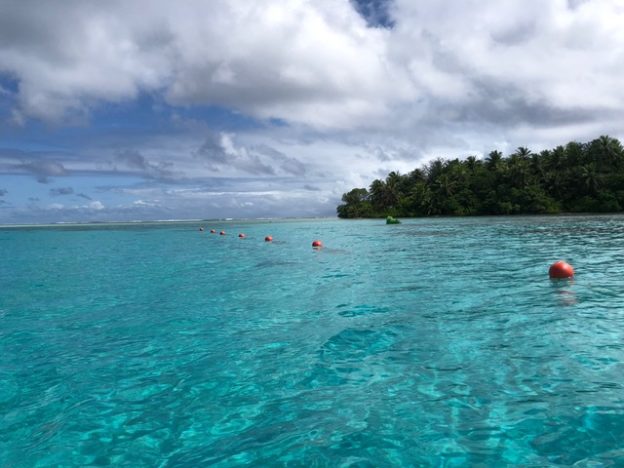Editor’s note: This article appeared first appeared in the ASU Thunderbird School of Global Management Knowledge Network e-newsletter.
Ask Solomon Frank about his typical workday after launching a start-up on a small tropical isle and he will talk about rolling out of a hammock for a day that includes fishing and swimming. Fishing is for sustenance; swimming is how he gets to work.
There is no checking email or seeing what the stock markets are doing because there is no Internet on the island. But pigs and chickens do get his and his co-workers’ daily attention; so do some food crops.
There’s also a cash crop to tend: seaweed. That’s where he gets down to the business of improving lives through economic development.
Frank, who was raised in Salem, Ore., believes seaweed farming is the solution to problems he observed in Micronesia, the land of his father. The people there need opportunities and options to raise their standard of living, he said.
“Nobody has jobs out there,” Frank said of a particular area of Pohnpei State. “They live simply, but some very minor adjustments could make things a lot better.”
Frank found a solution for the problem he is trying to solve at Thunderbird School of Global Management. He has spent the time since graduating in 2018 fine-tuning that plan and putting it into action, including traveling to Okinawa and Malaysia to observe seaweed farms, getting an import/export license and securing a grant from United Nations Environmental/Global Environmental Facility.
“Business wasn’t something that was on the forefront of my mind,“ Frank said. “Humanitarianism was behind my drive. Business was a means to an end. I want to help people. That’s what I like to do. I want to do it on a mass scale.”
Outer Atoll Resources, a nonprofit organization Frank founded with his father, Collen, is a first step toward that goal. It began with seeds, figuratively and literally.
From farm land to ocean waters
In Salem, Frank was raised with an appreciation for natural resources and how things grow. Farms are hard to miss there. His annual month-long trips to Micronesia from the time he was 12 helped him develop an appreciation for how things are there, too. The ocean is hard to miss.
The trip to Micronesia he took after he graduated in 2014 from Willamette University in Salem planted an idea to establish a business venture to address some of the underdevelopment holding the locals back. Thunderbird, he said, felt like the right place for him to find an answer, even though he had no idea what the solution was.
A dedication to environmentally sustainable development drew his attention to the islands natural resources. Instead of agriculture, Frank pursued aquaculture on Sapwauhfik Atoll, where his father owns land.
Thunderbird finance and global development classes influenced some of Frank’s thinking about the problems he wanted to solve. During his final semester, he researched oceanography and the biology of plants on the island. The farm, he determined, could be inside the lagoon where there is good water circulation. Reefs offered storm protection for the seaweed beds.
Outer Atoll Resources grows seaweed on a farm 50 meters from the island. Seaweed is a versatile crop used in all sort of products. Locally, seaweed provides islanders a nutritious alternative vegetable crop; it also can be used as a meal substitute for pigs and for fertilizer.
The nonprofit grows, harvests, dries and bales seaweed for export. It also produces sea grapes and sponges.
Outer Atoll Resources is teaching locals how to make things like coconut oil and soap for their own use. It also is creating a seed bank and collecting supplies to encourage other islanders to start businesses.
“We’re creating infrastructure for their farms, and then all they have to do is tend to them,” he said. “They’ll be good to go.”
Think local to go global
Frank has a firm belief that a rising tide lifts all boats. He will measure success of Outer Atoll Resources by growth in entrepreneurialism and business development. In the future, he expects to see higher employment rates. He also expects higher graduation rates as families have more money to put toward children’s education.
More opportunities to earn a decent living should stem the flow of out migration, Frank said. Micronesians leave the islands to find jobs in places like the United States. Frank said he wants people to stay home and live well.
“That’s the only reason people leave,” Frank said. “They don’t want to come to U.S. just to come. They want to come to the U.S. to work. They have no other intention.”
Frank has plans for vertical integration. With capital raised from exporting, Outer Atoll Resources would like to eventually reinvest in the business and purchase the machine used to process seaweed. Proceeds from added value would stay in Micronesia rather than go to export nations.
Growing the business would allow Frank to focus more on sales than harvesting and perhaps move on to more projects in different regions.
At Thunderbird, Frank said he learned that you have to think local to go global. He’s been doing a lot of thinking along those lines.
“I would love to help in other countries,” Frank said. “Thunderbird got me excited for it. If I can do this on a remote island, I think I can have a good chance of doing it on a main land.”
